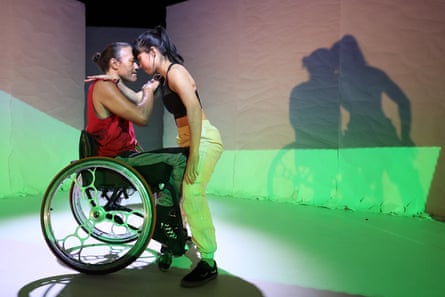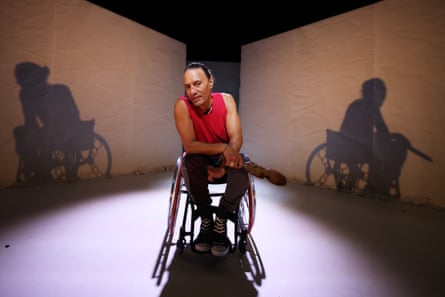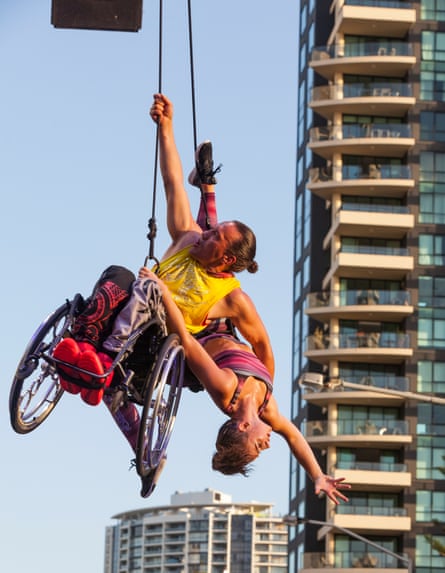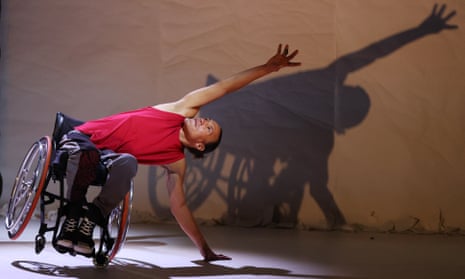The love of Rodney Bell’s life is his lightweight titanium wheelchair. It is his partner in dance and an extension of his body, allowing him to weave into his performances the elements of earth, wind, fire and water, as well as other cultural knowledge gifted by his Māori ancestors.
In his show Meremere, touring Australia this month, he and his chair dance as he tells the story of leaving New Zealand, becoming a principal performer with a dance company in the US, and then falling into homelessless for three years.
His dance for two, of course, continues off stage: Bell navigates daily life on Ngāti Maniapoto lands, south of Hamilton, in Aotearoa New Zealand’s North Island. He sometimes gets stuck on rougher terrain. “Sometimes I have to jump on the ground, pull the chair over, crawl up,” says the 51-year-old performer, his long hair oiled back, speaking via video link inside his small house in the small town of Te Kūiti. “It’s a lot of planning, which I love as well, as you’re always present.”

Bell grew up happily in this sheep-shearing borough; as a kid he did a little kapa haka or traditional line dancing, with culture and singing brought together at the local Māori meeting house, Te Tokanganui-a-Noho, and his small school, Pukenui. “But I didn’t really have a dream of dancing at all when I was young,” he says. “Dance found me after I acquired my disability.”
Bell left Te Kūiti for Auckland at the age of 15, to train as a butcher. He cannot remember the 1991 motorcycle accident that left him paralysed from the chest down at 20. He’d been playing rugby that day and drank a couple of beers after the game. Wood somehow pierced his abdomen, and his right arm was almost torn away. His body became a “new vessel” – but “what’s funny”, he says, “is I can’t even remember how I used to walk”.
After the accident, Bell had to rediscover how to balance his body and feed himself again, aided by rehabilitation nurses he calls his “mother guardians”: “They went over and above what rehabilitation is.” Skinny at the time, Bell says his training strengthened his body, helping him heal within a year. “And then my resilience, my manahau, started kicking in, my strength to chase life rather than let life push you back.”
Almost immediately, Bell became a vegetarian; after working as a butcher for five years he could no longer abide the slaughter of animals. He then began playing wheelchair basketball for New Zealand, and coaching young children in the sport.

One day a dance tutor, Catherine Chappell, came to show the children a video about “mixed ability” dance. She invited Bell to play harmonica at a workshop; instead, he found himself part of a dance improvisation, in which he fell, crawled and was pulled back to his chair. “The seed of dance was planted in my soul,” he recalls. In 2005 he travelled to Seattle for intensive training, which became a de facto audition when the artistic director of the California-based Axis company asked Bell if he would like to join.
His parting gesture to his New Zealand heritage was a large, spiralling ta moko, or traditional Māori tattoo representing his ancestors engraved across his back – which he sometimes incorporates into his shows. He moved to the US in 2007, where he was principal dancer at Axis until 2012.
But, losing interest and feeling homesick, he drifted away from the company, with little money saved and his family unable to help. He spent the next three years homeless, lining up at a shelter for a bed, which he would get for the night or longer if his name was called, or else sleeping on the banks of Lake Merritt.
Yet he continued to perform, getting a few jobs here and there and earning just enough busking – playing harmonica and guitar – to pay for health insurance. One day, while helping fix up wheelchairs for resale at a gathering of services for homeless people, Bell met a representative of HandUp: an organisation that helps people in need raise funds online. Through donations, he was able to finance a laptop and eventually a flight home to New Zealand, where he rebuilt his career – eventually performing for the 2018 Commonwealth Games in Queensland. For that dance, HuriHuri, he spun upside down with his chair on a 10-metre rig, while holding on to a fellow performer.

Meremere, originally conceived in 2016, is a sister performance to HuriHuri; it tells the stories of his life through dance, projections, lighting and live music. It’s named for a Māori weapon: a teardrop-shaped whip with a club base made from a native hardwood called black maire.
Bell’s brother gave him a chunk of the wood to carve when he returned to New Zealand in 2015. “While I was carving it, the chips on the ground reminded me of the sacrifices I had gone through to dance, like being away from my family so long, the homelessness, and the challenge of navigating the wheelchair, the physical challenges.” Bell says he was “sacrificing” the wood to make a beautiful thing, “yet it was beautiful already”.
New Zealand performances of Meremere have been received as inspirational and profound. Some people come to the show, Bell says, because they are curious about the nature of dance and how diverse dancers’ bodies can be; others have been prompted to reflect on their own sacrifices.
“Depending on where they are in life, there’s a lot of people that come up afterward and tell me they cried, then tell me their story,” he says. “It opens up the opportunity for people to express their own story to me, so there’s a lot of deep listening for me, too.”
Rodney Bell will perform Meremere at Darwin festival from 18-20 August; Sydney Opera House from 25-27 August; and Arts Centre Melbourne for the AlterState festival from 29 September to 1 October
